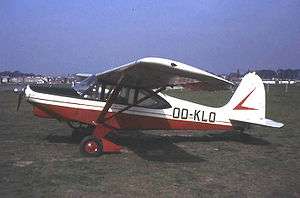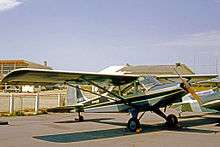Boisavia Mercurey
The Boisavia B.60 Mercurey was a series of four-seat light aircraft developed in France shortly after World War II.
| B.60 Mercurey | |
|---|---|
 | |
| Role | Civil utility aircraft |
| National origin | France |
| Manufacturer | Boisavia |
| First flight | 3 April 1949 |
| Number built | 46 |
Design and operations

Boisavia B.601L Mercurey of Omniair at Dijon's Val Suzon airfield in 1965
The Mercurey was a conventional high-wing braced monoplane with fixed tailwheel undercarriage. It was built in small numbers and found use in the normal general aviation roles of tourer, trainer, agricultural aircraft, and glider tug.
Variants
- B.60 Mercurey
- 3 prototypes powered by 100 kW (140 hp) Renault 4Pei engine
- B.601 Mercurey
- Powered by a 140 kW (190 hp) Avco Lycoming O-435-1 engine;three built.
- B.601L Mercurey
- Main production version, equipped with an 130 kW (180 hp) Avco Lycoming O-360-A engine;twenty-seven built.
- B.602 Mercurey
- Powered by a 123 kW (165 hp) Continental E165-4 engine;two built.
- B.602A
- 1x 159 kW (213 hp) Continental O-470-11
- B.603 Mercurey Special
- Glider tug version, powered by a 180 kW (240 hp) Salmson 8 As engine (Argus As 10);five built.
- B.604 Mercurey II
- Dedicated glider tug with lengthened fuselage, powered by a 170 kW (230 hp) Salmson 9ABc radial piston engine;one built).
- B.605 Mercurey
- Similar to the B.60, powered by a 130 kW (170 hp) Régnier 4LO2 (SNECMA 4L-02) engine;four built.
- B.606 Mercurey
- 130 kW (170 hp) Régnier 4LO20 (SNECMA 4L-00) engine;one built.
Specifications (B.60)
Data from Jane's All The World's Aircraft 1958–59[1]
General characteristics
- Crew: 1
- Capacity: 3 passengers
- Length: 7.20 m (23 ft 7 in)
- Wingspan: 11.38 m (37 ft 4 in)
- Height: 2.20 m (7 ft 3 in)
- Wing area: 18 m2 (190 sq ft)
- Airfoil: NACA 23.012
- Empty weight: 710 kg (1,565 lb)
- Gross weight: 1,277 kg (2,815 lb)
- Fuel capacity: 220 l (58.1 US gal; 48.4 imp gal)
- Powerplant: 1 × Lycoming O-320 4-cylinder air-cooled horizontally-opposed piston engine, 100 kW (140 hp)
- (or 170 hp (127 kW) Lycoming O-340)
- Propellers: 2-bladed Ratier fixed-pitch propeller
Performance
- Maximum speed: 235 km/h (146 mph, 127 kn)
- Cruise speed: 200 km/h (120 mph, 110 kn)
- Stall speed: 70 km/h (43 mph, 38 kn)
- Range: 1,200 km (750 mi, 650 nmi)
- Service ceiling: 5,500 m (18,000 ft)
- Rate of climb: 4 m/s (790 ft/min)
- Take-off run: 210 m (689 ft)
- Landing run: 150 m (492 ft)
gollark: You're on that many guilds? ¡
gollark: Potentially.
gollark: danny
gollark: Exactly, apiarist.
gollark: Or per regex.
References
- Bridgman, Leonard, ed. (1957). Jane's All the World's Aircraft 1958-59. London: Jane's All the World's Aircraft Publishing Co. Ltd. pp. 142–143.
Further reading
| Wikimedia Commons has media related to Boisavia Mercurey. |
- Bridgman, Leonard (1953). Jane's All The World's Aircraft 1953–54. London: Jane's All The World's Aircraft Publishing Company.
- Simpson, R. W. (1995). Airlife's General Aviation. Shrewsbury: Airlife Publishing. pp. 408–09.
- Taylor, Michael J. H. (1989). Jane's Encyclopedia of Aviation. London: Studio Editions. p. 192.
- World Aircraft Information Files. London: Bright Star Publishing. pp. File 890 Sheet 73.
This article is issued from Wikipedia. The text is licensed under Creative Commons - Attribution - Sharealike. Additional terms may apply for the media files.